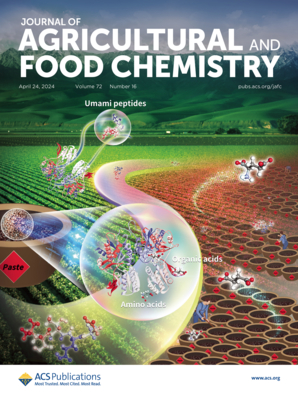Synbiotic Intervention with Inulin and Lactiplantibacillus plantarum LPm77 Attenuates Type 2 Diabetes via Enhanced TUDCA Metabolism and Gut-Liver Axis Modulation.
IF 6.2
1区 农林科学
Q1 AGRICULTURE, MULTIDISCIPLINARY
引用次数: 0
Abstract
Type 2 diabetes mellitus (T2DM) is a metabolic disorder characterized by inflammation and immune dysregulation, with the gut-liver axis playing a crucial role in immunometabolic balance. While dietary fibers show therapeutic potential, their mechanisms in T2DM remain unclear. This study investigates the effects of synbiotic intervention combining inulin and Lactiplantibacillus plantarum LPm77 on T2DM, focusing on the gut-liver axis. After 7 weeks of synbiotic treatment, significant improvements in hyperglycemia, insulin resistance, and hepatic steatosis were observed in T2DM mice. Inulin promoted L. plantarum LPm77 colonization, enhancing the gut microbiota balance and restoring the intestinal barrier function. It also regulated bile acid levels in the enterohepatic circulation. The synbiotic promoted tauro-ursodeoxycholic acid (TUDCA) biosynthesis, improving hepatic lipid metabolism and activating TGR5. TGR5 activation suppressed M1 macrophage polarization via the TGR5-TLR4-NF-κB pathway, reducing pro-inflammatory cytokines and increasing IL-10, thus alleviating systemic inflammation. This study highlights a novel therapeutic approach targeting immune-metabolic dysregulation in T2DM.菊粉和植物乳杆菌LPm77通过增强TUDCA代谢和肠-肝轴调节的联合干预减轻2型糖尿病。
2型糖尿病(T2DM)是一种以炎症和免疫失调为特征的代谢紊乱,肠-肝轴在免疫代谢平衡中起着至关重要的作用。虽然膳食纤维具有治疗潜力,但其治疗2型糖尿病的机制尚不清楚。本研究以肠肝轴为主,探讨菊粉联合植物乳杆菌LPm77对T2DM的综合干预作用。综合治疗7周后,T2DM小鼠的高血糖、胰岛素抵抗和肝脂肪变性均有显著改善。菊粉促进植物乳杆菌LPm77定植,增强肠道菌群平衡,恢复肠道屏障功能。它还能调节肠肝循环中的胆汁酸水平。该合成物促进牛磺酸-熊去氧胆酸(TUDCA)的生物合成,改善肝脏脂质代谢,激活TGR5。TGR5激活通过TGR5- tlr4 - nf -κB途径抑制M1巨噬细胞极化,减少促炎细胞因子,增加IL-10,从而减轻全身炎症。这项研究强调了一种针对T2DM免疫代谢失调的新治疗方法。
本文章由计算机程序翻译,如有差异,请以英文原文为准。
求助全文
约1分钟内获得全文
求助全文
来源期刊
CiteScore
9.90
自引率
8.20%
发文量
1375
审稿时长
2.3 months
期刊介绍:
The Journal of Agricultural and Food Chemistry publishes high-quality, cutting edge original research representing complete studies and research advances dealing with the chemistry and biochemistry of agriculture and food. The Journal also encourages papers with chemistry and/or biochemistry as a major component combined with biological/sensory/nutritional/toxicological evaluation related to agriculture and/or food.

 求助内容:
求助内容: 应助结果提醒方式:
应助结果提醒方式:


